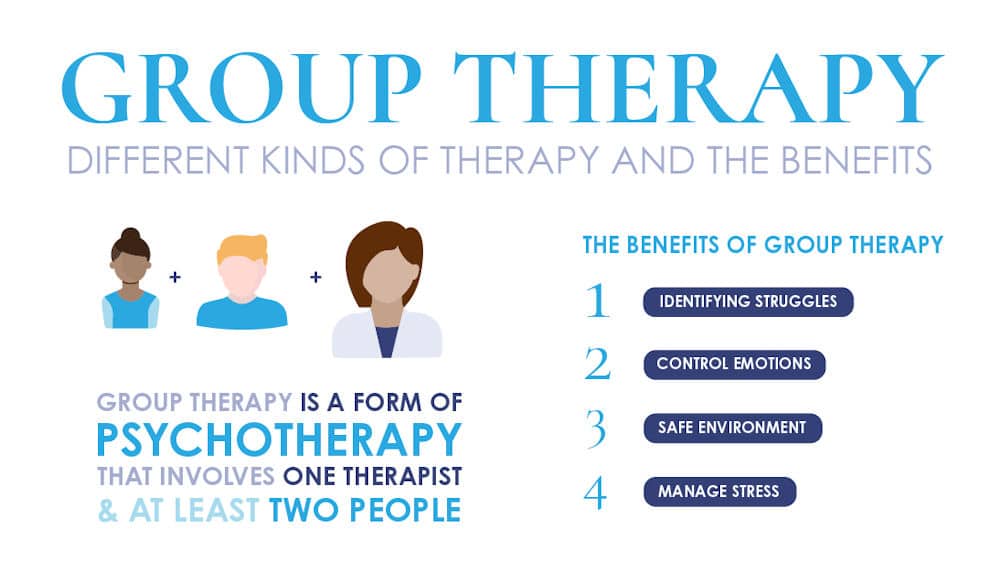It”s important to note that the most essential and beneficial type of psychotherapy is the therapy that meets the patient’s particular needs. Various forms of therapy take advantage of patients’ policies. Oftentimes, the most effective resource for dealing with specific obstacles or even personal matters is when people connect with other individuals who have shared similar experiences.
Entering a drug and alcohol treatment program is considered a vital step towards addiction recovery and a step that takes a considerable amount of relentless effort and courage. The actual thought of facing demons and altering your life for the better in various significant ways can elicit a combination of many emotions, including hope, anxiety, even maybe fear. The most anxiety-provoking facet of addiction treatment for numerous individuals is the therapy process.
It is common to experience some extent of resistance to the actual likelihood of baring a soul to a stranger in group counseling for substance abuse or group therapy for addiction. What is more intimidating is the overall idea of group therapy, which is more of a fundamental aspect of most of the drug and alcohol treatment programs. Even though both individual and group therapy are specifically designed to assist individuals in the following ways:
- Work through demanding concerns
- Learn healthier coping skills
- Help individuals gain insight
What Is Group Therapy?
Group therapy for substance abuse is considered a psychotherapeutic approach that uses personal interaction with various individuals who have experienced similar issues. It is intended to assist individuals to cope and grow deeply. In a nutshell, group therapy for addiction involves two or more individuals simultaneously, in addition to the therapist, instead of one person in recovery doing the work one-on-one with a therapist.
The actual definition of group therapy is a form of psychotherapy in which a group of clients meets to discuss a common problem. Typically, participants in group therapy will take turns discussing feelings, experiences, goals, and struggles. Group counseling for substance abuse might be specific to a particular recovery topic, such as how to identify and avoid relapse, or it might be more general such as how to manage difficulties among peers, work, interpersonal relationships, and family matters.
There are various versions of group therapy that include drug rehabilitation, post-traumatic stress disorder (PTSD) support, grief counseling, and more. Group counseling for substance abuse sessions will occur under the supervision of a psychologist or mental health counselor. Generally, group therapy for addiction sessions will be arranged by the therapy leader, who will give the therapy group a set of guidelines and rules.
The above-mentioned set of guidelines and rules are geared to assist each individual in connecting and growing more healthily and intentionally. There are numerous sizes of therapy groups; the number of participants isn’t always a remarkable factor when it comes to constructing group therapy for addiction sessions. The most vital goal is that individuals who have joined group therapy for substance abuse will have beneficial experiences.
Overall, the act of sharing personal information in the therapy group and learning from one another will act as a catalyst for an overall successful group therapy session. When individuals can share similar experiences, it showcases one of the main ways that group therapy differs from other therapies, such as couple therapy. Group therapy for substance abuse works the best when a participant is helping others reach out of their social circles and comfort zones to fully start connecting with strangers undergoing similar issues.
What Should Someone Expect in Group Therapy for Substance Abuse?
There are various options a person should expect in group counseling. Group therapy sessions might be closed or open – meaning new members can join at any time which makes it an open situation. Another option is closed groups which are designed often for a prearranged number of months or weeks.
Therapy groups that are in the outpatient treatment setting are usually closed. The therapy groups might be led by a single counselor or single therapist or co-led by at least two therapists. Therapists should have training and experience doing group therapy and be licensed.
The overall role of a therapist should be to lead the group process, ensure that the atmosphere is healthy, safe, productive, and cohesive, set and reinforce guidelines and group rules. Group therapists will do the following:
- Observe how participants interact in the group therapy session
- Give appropriate feedback
- Encourage participants
- Ask questions
The main goal is to assist all participants that benefit in a method that moves individuals closer to attaining their individual treatment goals. One of the most crucial segments of group therapy is confidentiality. For individuals to feel safe to open up in group therapy, all of the participants are expected to honor and respect the confidentiality of everyone in the group.
Depending on the particular treatment setting, one of the group rules might be that participants abstain from interacting with one another outside of the group setting while they are actively involved in the group therapy. The group therapy sessions typically last at least a whole hour and often last from about 1 ½ to 2 hours. The longer length can help ensure that each person has an opportunity to give their contribution to the group sessions.
Group sizes can vary, but usually, on average, the therapy groups generally have between 5 and 10 participants in the group at a time. Having too many or too few participants in a group can negatively impact the entire group process. In outpatient therapy groups, they generally meet only once a week.
What Are the Benefits of Group Therapy?
There are numerous unique benefits of group therapy for substance abuse such as the following:
Universality or a Sense of Belonging
Individuals with substance use disorders or alcohol use disorders have often become isolated from friends, family, and the world. Substance use generally interferes with relationships and might even cause irreversible damage. Group therapy allows people to experience a sense of belonging and connection that might’ve been missing previously before in their lives.
Having and welcoming the realization that they aren’t alone is paramount. Being able to relate to other individuals that can relate to struggles and pain assists in alleviating the sense of isolation, which in turn allows for positive change and healing to occur.
Giving and Receiving Support
One of the most dynamic benefits of group therapy is the opportunity that participants have to support one another and provide accommodating feedback and knowledge that is based on their internal struggles and experiences. The individual offering the support and the individual receiving it both experience a benefit from this exchange. Individuals who can provide the support that is necessary often feel empowered by the realization that they acquire something valuable to others, not to mention the overall rewarding feeling of helping someone else.
By engaging in the above-mentioned scenario, self-esteem will be improved which will play a vital role in maintaining overall sobriety. Receiving necessary support allows the group participants to realize that it’s okay to assist other individuals. The act of helping others often inspires individuals to support other individuals moving forward.
Learning New Ways of Interacting
The participants who are in the therapy groups can learn more appropriate ways of interaction from various other group members, as well as their group leader. Because therapy groups often serve as a cross-section of each person’s life outside of the group, dysfunctional patterns that relate to others will surface eventually. The therapy group is considered a safe place for people to dive into practicing new ways of interaction and begin building new healthy relationships with various other participants.
Greater Communication Skills
Group therapy can provide an overall safe setting for individuals to practice communicating in a way that is open, honest, respectful, and assertive. For various participants, this might be completely new territory for them. Participants can dive into and practice giving and receiving constructive feedback without getting defensive or attacking others.
Various Perspectives
Group therapy gives every individual a chance to hear various perspectives, instead of simply hearing the perspective or view of their therapist. This can provide an opportunity for individuals to consider several ways of looking at their overall situation, issues in which they are struggling, and ultimately themselves. Entertaining the realization that there are nearly numerous strategies to view something can enhance the following:
- Enhance problem-solving skills and allow them to understand
- Move past old perspectives that might have created obstacles
Peer Feedback
One of the most beneficial and powerful facets of group therapy is the opportunity to gain feedback from other like-minded peers. Individuals will often feel more receptive to the feedback they receive from various other participants rather than from their therapist. This is due largely to the overall perception that various other participants can relate to their issues or struggles more readily than their therapist.
Building a Support System and a Better Relationship
It is extremely common for participants to end up developing friendships with various other group members. These sparked new friendships can provide a healthy source of continuous encouragement and support long after treatment has been completed. In turn, this can increase the overall likelihood of long-lasting sobriety.
Hope for a Better Future
When you live with a substance use disorder or alcohol use disorder, it can leave individuals feeling lost or helpless, with little to no hope that they can live their lives the way they want to. Group therapy allows individuals to witness other individuals making positive changes while also working on their progress. The group members can celebrate and affirm their victories, while also supporting one another during challenges and setbacks. Overall, this can provide a mighty sense of hope that fuels the recovery process.
Are There Any Potential Drawbacks?
Even though group therapy offers numerous benefits, it’s pivotal to understand that there are also disadvantages.
Less Personal Attention
In individual therapy, the patient is considered the main focus of the therapist’s attention. But in group therapy, the therapist’s attention is spread throughout the entire group. The quieter individuals might start to feel invisible, especially if there are one or more super talkative individuals who tend to dominate the group sessions. For example, a proficient therapist will strive to ensure that each person has the opportunity to contribute and will also be proficient at drawing individuals back in regarding those who tend to disappear in the background.
Confidentiality Concerns
Therapists are not only expected but required to honor confidentiality as a part of their professional ethics. However, in group settings, there is no guarantee that all of the participants will honor the confidentiality of their fellow group members. One of the most effective ways, even though it isn’t guaranteed) to counteract this risk is for the group therapist to strive to enhance the overall group cohesiveness.
Group Therapy for Substance Abuse at Chapter’s Recovery

Even though it might seem uncomfortable, intimidating, and scary to participate in group therapy at first, the majority of individuals find that once they attend a couple of sessions, their initial fears will subside. It’s an honor to be surrounded by a small group of peers who have walked in your shoes, support you, can share your struggles, and celebrate you on your recovery journey. Learn more about our programs by contacting us today.



